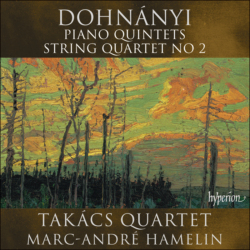Classical CD Review: Hungarian Composer Ernő Dohnányi — Love at First Listen
By Susan Miron
This is a gem of a recording, a wonderful introduction to this often overlooked Hungarian composer.
Ernő Dohnányi Piano Quintets & String Quartet No 2, Takács Quartet, Marc-André Hamelin (piano) (Hyperion)

The fourth collaboration of the formidable pianist Marc-André Hamelin and the extraordinary Takács Quartet (Edward Dusinberre and Harumi Rhodes, violins; Geraldine Walther, viola; András Fejér, cello) is devoted to works of Ernö Dohnányi (1877-1960), and if any CD can make you an instant fan of this Hungarian composer, this is it. If you love Brahms, it is likely you will adore this music.
The first three CDs featuring this superb collaboration (all for Hyperion) included piano quintets by César Franck, Dmitri Shostakovich, and Robert Schumann. I had initially underestimated Dohnányi, knowing only a few of his works, such as his charming Serenade (for string trio), “Variations of a Nursery Tune,” and the lovely but sadly neglected Harp Concertino. The excellence of this CD — the music and the performances — made me want to hear nothing but this album for several days. This recording is mesmerizing, in no small part due to the brilliant contributions of amazingly versatile composer-pianist Marc-André Hamelin. He has recorded over 60 CDs for Hyperion and their range is awe-inspiring: from music by extremely obscure composers (Medtner, Alkan, and Godowsky) to his own Études in minor keys and the three best Haydn Sonata recordings I have ever heard. His Chopin, Schumann, and Debussy are terrific as well.
The elderly Johannes Brahms, who wrote one of the greatest of all piano quintets, was extremely impressed when he heard the first performance in 1895 of the 18 year-old’s student work, his Piano Quintet No. 1 in c minor, Opus 1. Brahms remarked, “I could not have written it better myself.”
Dohnányi, five years older than his fellow Hungarian composers Bela Bartók and Zoltan Kodaly, was extremely influential in the musical life of his homeland. Unlike Bartók and Kodaly, he had little interest in his country’s folk music. Considered the greatest Hungarian pianist since Liszt, Dohnányi had a dazzling concert career; interestingly, he was the first major pianist with an international reputation to feature chamber music in his concerts on a regular basis. He was no slouch as a solo pianist, performing Beethoven’s complete piano music in one season and playing all 27 of Mozart’s piano concerti in another. A gifted conductor (Budapest Philharmonic Orchestra), Dohnányi championed works by neglected Viennese composers, of whom he was musically a kindred spirit.
The enchanting three-movement String Quartet No. 2 in D Flat Major, Op. 15 (1906) is considered to be among the very best of post-Brahmsian romantic string quartets. The Takács Quartet plays it superbly, as they do the other compositions on this album.
The Piano Quintet No. 2 in E-flat minor, Op. 26 (1914) was written at the time that Dohnányi was producing “Variations on a Nursery Tune” (1914), which was scored for piano and orchestra; his Violin Concerto No. 1 in D minor (1914-15); and Six Concert Études for Piano (1916). By the time the Quintet was completed, Dohnányi had achieved global renown as the heir apparent to Liszt. Between the years 1919 and 1921, when the postwar period had made it difficult to bring in guest artists, Dohnányi performed some 120 concerts a year in Budapest alone. Bartók remarked that Dohnányi provided Hungary’s entire musical life during that time.
This is a gem of a recording, a wonderful introduction to this often overlooked Hungarian composer.
Susan Miron, a harpist, has been a book reviewer for over 30 years for a large variety of literary publications and newspapers. Her fields of expertise were East and Central European, Irish, and Israeli literature. Susan covers classical music for The Arts Fuse and The Boston Musical Intelligencer.
Tagged: Ernő Dohnányi, Hyperion, Marc-Andre Hamelin
